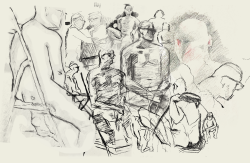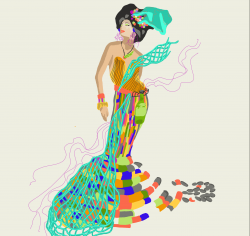Early in January, 20 men dressed in uniforms of the Mexican Federal Police force and armed with AK-47s blocked off Anabel Hernández’s street in a quiet neighborhood of Mexico City. After scaring and bullying her neighbors into submission, they broke into her home. Mercifully, she wasn’t there. This incident was not the first attempt on Anabel Hernández’s life.
I wish I were enticing you to read a fun, fictional political thriller, but these assassination attempts are real. Hernández has faced countless threats and multiple attacks in response to the argument she makes in her book Narcoland.
Political accounts on the drug trade abound, and it’s no surprise, given its volatile history and entanglement with government corruption. During the 1980s, the U.S. funded “contras”—guerilla groups in Latin America fighting leftist regimes and potential Communist influence. Among the groups they armed and supported were Mexican drug cartels, then small-scale and happy for cash and arms to bulk up power.
When the Managua accords were signed in 1989, ending the war and sufficiently suppressing Latin American leftists, the cartels lost their main benefactor, Uncle Sam. The sudden withdrawal of funds of this stabilizing factor spurred war for market dominance and power.
With meticulous research, including first-hand accounts, government documents, and confessions to the Drug Enforcement Administration, Hernández argues that the Mexican government is essentially acting as the armed wing of the Sinaloa cartel. Their battle to the top of the business has left 70,000 dead and counting.
The Sinaloa cartel controls 60 percent of all drugs trafficked into the United States. Behind this empire is a man listed on both the Fortune 500 and Chicago’s Most Wanted—one Joaquin “El Chapo” Guzmán.
El Chapo ran his cartel from Puente Grande Maximum Security Men’s Prison for 11 years. He had a cell phone, visits from his employees, conjugal visits from an array of women, days-long Christmas parties with his family, and innumerable other benefits uncovered by Hernández’s investigation.
Then, in March 2003, El Chapo escaped. Supposedly, he was smuggled in a laundry basket, bypassing an all kinds of security, including heat-sensors and x-ray detectors. Subverting the narrative released by the government and spread by the media, Hernández has uncovered that El Chapo walked out with the direct aid of a number of government officials. Hernández is adamant and complete in emphasizing the collusion of the then-leader of the Federal Investigation Agency, Genaro García Luna.
One of the informants that Hernández cites said, “during the [Vincente] Fox administration [2000-2006], the public officials became employees of the drug traffickers and their armed wing,” especially the AFI, headed by García Luna, one of whose first hires—the head of Civilian Forces, Gerardo Garay—was caught on video taking instructions from El Chapo’s men.
Now, Fox’s successor teaches at Harvard, García Luna is relaxing in Miami, and, as for the leaders of the CIA during the Iran-Contra affair? Not one of them served jail time, and most were pardoned by President H.W. Bush before they even had to appear in court. Where the U.S. government left the explosives, Mexican corruption detonated the bomb.
Hernández’s book is the first to have such a comprehensive vision of the depth of the Mexican government’s corruption from the 1960’s through today. Narcoland is unique in its thesis—never before has the Mexican Government been shown to be so deeply entrenched in criminal activity. Hernández’s historicist, proof-oriented approach and shocking content make Narcoland a story too awesome to put down.
Hernández herself is inspiring, tenacious, and a veritable bad-ass, but she is first and foremost an outstanding journalist. She inserts none of her personal narrative into the book, focusing on facts and presentation in a clear and correct way.
Her story is just as telling as the broader narrative of the drug war she presents in Narcoland. Hernández started her career as a journalist in the 1990s after her father was mysteriously kidnapped and killed. The police refused to take on the case unless Hernández’s family paid them a bribe. Since then, she has been at the forefront of a group of brave truth-tellers who are continually persecuted by the cartels and the government. Journalists are found dismembered or hung with warning signs: “Stop snooping, or you’re next.”
What book is so powerful that it has the government and their supposed foes attacking its author in speech and action? It is sobering, shocking, striking—and a reminder that we are playing with lives when we buy drugs, as petty an action as that might seem.




